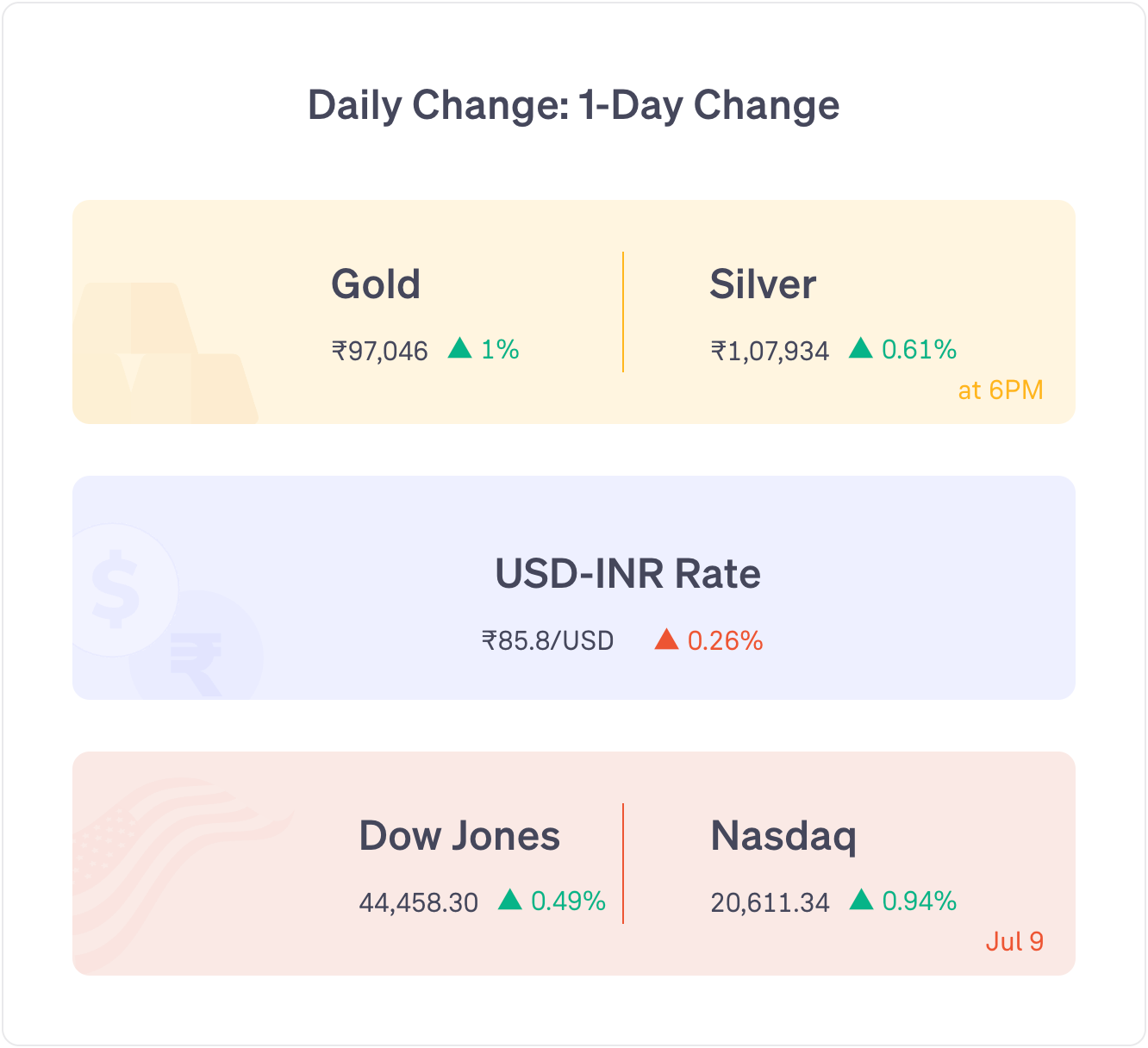Markets opened slightly above yesterday’s closing point.
Nifty 50 fell in the first half of the day and closed in red.
Realty stocks and metal stocks rose the most today. PSU bank stocks and IT stocks fell the most.
Global markets: US markets rose. Most European and Asian markets also rose.
News
RBI proposed new rules for transferring OTC derivative contracts that require proper consent, fair pricing, and a three-party agreement. OTC (Over-the-Counter) derivative contracts are financial agreements traded privately between 2 parties, rather than through a regulated exchange.
Smartworks Coworking IPO has been subscribed 0.50 times. Retail subscription: 0.57 times. Open for subscription till 14 July.
Stocks Updates
TCS: net profit rose 6% year-on-year to Rs 12,760 crore in the April-June quarter. Dividend declared: Rs 11 per share. Record date: 16 July.
InterGlobe (IndiGo): company arm, IndiGo Ventures, raised Rs 450 crore and made its first investment in AI-based aerospace startup, Jeh Aerospace.
Waaree Energies: will sell 2.4% stake of its subsidiary, Indosolar, to meet minimum public shareholding norms.
GAIL: signed a 15-year agreement with Oil India to source up to 9 lakh SCMD of natural gas from Rajasthan fields for supply to a Rajasthan state power plant.
HCL Tech: signed a 10-year deal with Dunedin City Council in New Zealand to upgrade its IT services.
Word of the Day
Open Market Operations (OMO)
They are one of the tools used by central banks to control the supply of money in the economy
OMO is usually used to control inflation.
Central banks like RBI do this by buying/selling government bonds in the open market.
Example: RBI sells government bonds to banks or the public. The banks or investors pay money to the RBI for these bonds.
This way the amount of cash in the banking system gets reduced, which helps control inflation by reducing spending in the economy.
6 Day Course
Theme: Warren Buffett’s checklist
Day 4: Thursday
A concept that has been popularised by Warren Buffett is that of a moat.
Moat is what prevents competition. Companies that face a lot of competition often do poorly since their profit margins are very low.
He prefers companies that have a strong moat that can include patents, brand value, lisences and approvals, high loyalty of users, location advantage, etc.
Some examples of this are: Coca-Cola (brand), Pharma companies (patents), Apple (brand and loyalty).
He believes companies with a good moat often have better profit margins and return on capital employed in long term.
And, it allows companies to maintain their profit margins with time. This is why he likes companies that have demonstrated an earnings growth year on year throughout most of their history.
Featured Question
Q. “Why do companies file for IPO with SEBI through the confidential route ? What are 'other' routes to file IPO ?”
One of the biggest reasons for doing so is keeping numbers private for longer.
Many companies operate in industries where competition is intense and companies try to prevent or delay letting their competitors know about their numbers.
When a company files for an IPO via the confidential route, only SEBI is made aware of the companies’ details.
Once approved, then the company can go for an IPO and make the numbers public.
This allows the companies to keep their numbers private for longer — though eventually the numbers will become public knowledge (mandatory for IPO and listed companies).
Many times, companies apply for IPO but do the actual IPO much later.
This way, in case they decide to delay or do their IPO much later, their numbers remain a secret for longer.
So in short, companies have to make their numbers public before an IPO under the regular route. In case of confidential route IPOs, they are able to keep it private for a little while longer.
Did you like this edition?
Leave a feedback here!






